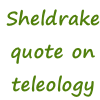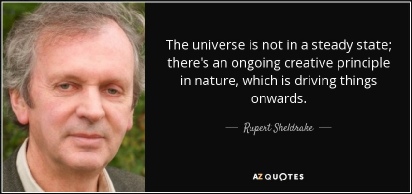



 NEXT
NEXT
 BACK
BACK
 Forum
Forum


Philosophical musings on Quanta & Qualia; Materialism & Spiritualism; Science & Religion; Pragmatism & Idealism, etc.






A New Science
of Life
Post 44. 07/04/2018
Empirical vs Theoretical Science
Dialogue on the Nature of Science
This dialogue between two scientists on the gray area between Modern/Reductive/Empirical Science and Postmodern /Holistic/Theoretical Science, is a good example of the quandary addressed by the BothAnd principle. When sincere people agree on the goal, but disagree on the route, how can we find our position on the truth scale? Michael Shermer was trained as a psychologist, and is now a professional skeptic, defending mater-
My own theory of EnFormAction is similar to Morphogenesis, but my mundane experience of reality doesn't jibe with some of Sheldrake's spin-
Ultimately, it's just a small part of the wider debate between Theism & Atheism, Modernism & Postmodernism, Rationalism & New Ageism, Scientism & Spiritualism, Holism and Atomism, Fideism & Skepticism. And my current position falls somewhere in the middle, just as Deism overlaps theism and atheism. So, is my middling position tenable in the quest for truth? Although I have some sympathy for the unorthodox scientific views of Sheldrake and Deepak Chopra, I can't subscribe to their primacy of Intuition & Emotion over Reason & Sensation. That's because I have my own rules of evidence.
I'm aware that, for most people, beliefs & feelings come first, then “reasons” to prop-
Where I agree with the New Agers is that that Atomism & Materialism only made sense until science discovered Quantum Fields & Cosmic Expansion. Now the former firm foundation of particulate matter seems to be built upon a substrate of holistic fields of potential. Einstein's cosmology, when he produced his iconic E = MC2 formula, envisioned an eternal universe with only local cycles of change. But he had to change his mind after the Big-
Post 44 continued . . . click Next
Empirical Evidence :
Generally consists of information derived from the five senses, or via techno-
Like most scientific debates, Ultimately, this one will be resolved when we have practical appli-
• Any new mind-
• Without empirical evidence, theories tend to become self-
• Evidence must be interpreted in light of some general theory or worldview. The materialist paradigm of science, and the spiritualist faith of religion will yeild different interpretations.
1. Was evolution pre-
Dialogue on the Nature of Science :
https://thebestschools.org/special/sheldrake-
https://www.scientificamerican.com/article/ruperts-
• Theoretical philosophy consists of open-
• Einstein was a theoretical scientist, but his theories were confirmed by Empirical evidence.
• Sheldrake is a theoretical scientist, and Shermer is asking, “where is the evidence?”
• A TED talk by Sheldrake, entitled The Science Delusion was uploaded to YouTube, but then removed after many objections from scientists. It was sub-
• Sheldrake website :
https://www.sheldrake.org/

